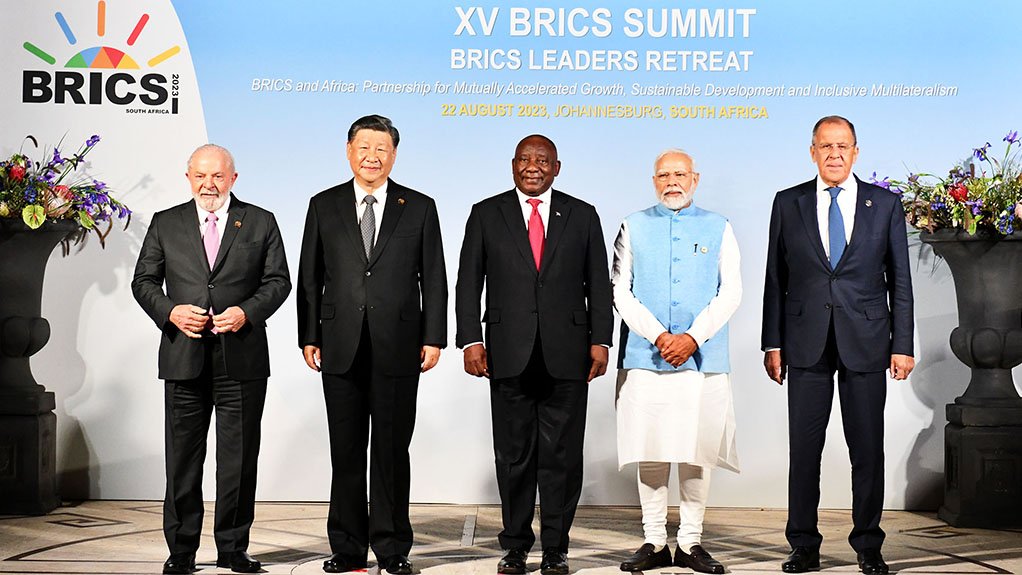The watershed 15th Brics Summit held in Johannesburg had, to its credit, several runs on the scoreboard by the time it concluded last week. While the outcomes were inevitably a complex amalgam of politics, economics and business, the overall Brics profile and agenda have been taken to the next level. Brics wants to enlarge its sphere of influence in the global economy. Hence, apart from the addition of six new members – Argentina, Iran, Saudi Arabia, Egypt, Ethiopia and the UAE – the Summit’s broad aspirational goals and decisions are signalling a potential new era for Brics in the years ahead.
On the Brics expansion there remains much uncertainty as to the criteria used to select the additional members. The economic rationale for the choices is not immediately apparent. It seems the Brics consensus on the ‘six pack’ of new members was inevitably the result of heavy political horse-trading during the Summit proceedings, which is liable to stoke political controversy. In any event, such an enlarged Brics group of eleven members is indeed likely to be a very different collaborative ‘mix’ from the present Brics five constituents, and with its decisions being determined by consensus.
Behind the headlines, though, serious technical work now needs to start to bring about the economic diversification and recalibration envisaged by the Brics Summit declaration. The rhetoric must now be matched with reality. The pace of progress may well be determined on an incremental basis in various technical forums, which are ‘below the radar’ but are essential for narrowing the gap between symbolism and substance. Achieving this balance between legitimacy and effectiveness remains a big challenge for any global formation today.
Leaving geopolitical considerations aside, the Brics Summit can be regarded as a valuable enabler and facilitator of new trade and investment opportunities generally, both for existing Brics members and the newcomers when they come on board at the beginning of 2024. Importantly, the first day of the Summit was allocated entirely to the business sector, and the ‘network effects’ and positive spillovers should not be underestimated – particularly as they enabled various business networks to explore areas of common economic interest and/or immediate transactional value.
Also, on the helpful side, the prospect of lending more in local currency may have more to do with good liability management than with ‘de-dollarisation’. And to the extent that the latest Brics developments are intended to promote genuine multilateralism in the world economy, they should be seen in a positive light. But if a better balance in the global economy is to be achieved, the focus should be on trade creation, not trade diversion. ‘Win-win’ outcomes must form part of the multilateralism narrative, although the jury remains out for now on ‘where the chips may fall’ and what these outcomes should look like.
And where does SA now stand in the wake of the Summit? How can SA participate more strategically in line with its national interests? How does SA maximise the opportunities and minimise the risks? If, as President Cyril Ramaphosa has emphasised, SA’s foreign policy aims to serve the national interest, what are some of the tests that SA should now apply to determine how well it will fare in the changing Brics landscape?
Here are seven:
- As a small economy in a now enlarged Brics, will SA take the necessary steps to enable it ‘to box above its weight’?
- Will participation in a ‘new-look’ Brics help to advance South Africa’s key economic interests elsewhere in the world?
- Although a Brics common currency is now rightly on the back burner, will SA ensure that Brics’ aim to expand trade in local currencies is to the benefit of the rand?
- Will the expansion of trade relations within Brics facilitate beneficiation or value-added outcomes within the SA economy?
- Will SA be able to reconcile its participation in a larger and more active Brics with its unfolding commitments under the African Continental Free Trade Area (AfCFTA) Agreement?
- Will SA undertake the necessary domestic policy reforms and projects to ensure that it is competitive enough to exploit new opportunities arising from a bigger, weightier Brics?
- With SA having collaboratively hosted a successful Brics event, can government and business expand and deepen their partnership to improve SA’s economic performance at other levels?
With the curtain having come down on the 15th Brics Summit, SA faces a daunting challenge: to help turn the decisions taken at the Summit into reality, while also ensuring that they become the vehicle for progressive economic gains for the country. In particular, SA will need to pause and rigorously interrogate what it needs to do to enlarge its share of Brics’ trade and investment flows. Also, with Brics’ geopolitical dynamics about to change, SA will thus be required to strategise afresh to ensure that its national interests are indeed protected as events (invariably often beyond its control) continue to unfold in the global economy.
Written by Prof Raymond Parsons, Economist at the North-West University Business School
EMAIL THIS ARTICLE SAVE THIS ARTICLE ARTICLE ENQUIRY
To subscribe email subscriptions@creamermedia.co.za or click here
To advertise email advertising@creamermedia.co.za or click here











